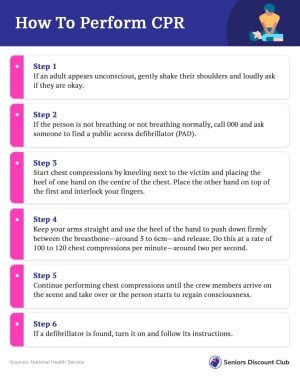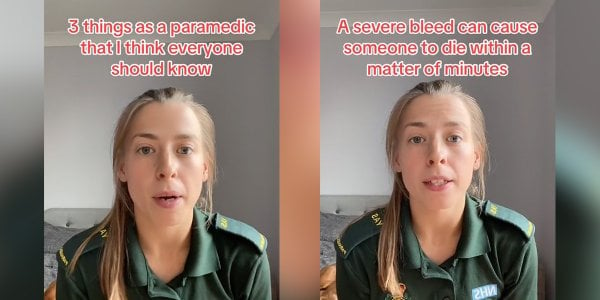Paramedic reveals three life-saving facts everyone must know!
By
Seia Ibanez
- Replies 3
In the face of an emergency, would you know what to do?
A paramedic has taken to social media to share three crucial advice that could save a life.
These tips are essential for everyone, regardless of age or health status.
The paramedic has been sharing her professional insights and experiences to help educate the public about first aid on social media.
In her video online, she delved into her top three tips, supplementing them with additional advice from the National Health Service and other health organisations.
1. How to Stop a Severe Bleed
A severe bleed can be life-threatening if not addressed promptly.
‘A severe bleed can cause someone to die within a matter of minutes, so it's vital that someone can act fast before the emergency services arrive,’ the paramedic said.
The paramedic emphasises the importance of acting quickly before emergency services arrive.
Other experts advised that if someone is bleeding heavily, the main aim is to prevent further blood loss and minimise the effects of shock.
If you have disposable gloves, use them to reduce the risk of any infection being passed on.
Check that there's nothing embedded in the wound. If there is, avoid pressing down on the object. Instead, apply pressure on either side of the object and build up padding around it before bandaging.
If nothing is embedded, apply and maintain pressure to the wound with your gloved hand, using a clean pad or dressing if possible.
Continue to apply pressure until the bleeding stops. Use a clean dressing or any clean, soft material to bandage the wound firmly.
If bleeding continues through the pad, apply another pad over the top and bandage it in place.
2. How to Help Someone Who is Choking
Choking and suffocation as causes of death were highest for people aged 65 and over in Australia.
The paramedic said that ‘quick reactions and good quality first aid training can literally be the difference between life and death'.
If the person is choking severely, administer back blows or abdominal thrusts.
To give a back blow, stand behind the person, support their chest with one hand, lean them forward, and give up to five sharp blows between their shoulder blades with the heel of your hand. If the blockage has not cleared, give up to five abdominal thrusts.
If the person's airway is still blocked after trying back blows and abdominal thrusts, call 000 immediately.
But if you’re living alone and unable to speak when calling the ambulance, you can use a two-digit code.
An ex-paramedic shared, ‘Although you'll be unable to talk, they'll eventually ask you to press 55 to indicate that you need help.'
When unable to talk due to injury, distress or danger, your call will be redirected to an Interactive Voice Response system. You can read more about this advice here.
3. How to Perform CPR
Cardiopulmonary resuscitation (CPR) is a life-saving technique that is used when someone's breathing or heartbeat has stopped.
The paramedic said, ‘Effective CPR and the use of an automated external defibrillator (AED) will make it four times more likely that someone will survive a cardiac arrest.’.
Experts provided a step-by-step guide on how to perform CPR.
Step 1: If an adult appears unconscious, gently shake their shoulders and loudly ask if they are okay.
Step 2: If the person is not breathing or not breathing normally, call 000 and ask someone to find a public access defibrillator (PAD).
Step 3: Start chest compressions by kneeling next to the victim and placing the heel of one hand on the centre of the chest.
Place the other hand on top of the first and interlock your fingers. Keep your arms straight and use the heel of the hand to push down firmly between the breastbone—around 5 to 6cm—and release. Do this at a rate of 100 to 120 chest compressions per minute—around two per second.
Songs like Stayin’ Alive by the Bee Gees, Eye of the Tiger by Survivor, and Wannabe by the Spice Girls all have 100 to 120 beats per minute, so these are recommended by experts while performing CPR.
Step 4: Continue performing chest compressions until the crew members arrive on the scene and take over or the person starts to regain consciousness.
Step 5: If a defibrillator is found, turn it on and follow its instructions.
The defibrillator will detect when a shock is needed. However, some devices will shock without prompts, while others advise the user if a shock needs to be pushed to deliver it.

Members, if you or someone else is in a critical situation, dial 000 immediately for emergency assistance.
 What other first-aid tips do you think are essential? Share your thoughts in the comments below.
What other first-aid tips do you think are essential? Share your thoughts in the comments below.
A paramedic has taken to social media to share three crucial advice that could save a life.
These tips are essential for everyone, regardless of age or health status.
The paramedic has been sharing her professional insights and experiences to help educate the public about first aid on social media.
In her video online, she delved into her top three tips, supplementing them with additional advice from the National Health Service and other health organisations.
1. How to Stop a Severe Bleed
A severe bleed can be life-threatening if not addressed promptly.
‘A severe bleed can cause someone to die within a matter of minutes, so it's vital that someone can act fast before the emergency services arrive,’ the paramedic said.
The paramedic emphasises the importance of acting quickly before emergency services arrive.
Other experts advised that if someone is bleeding heavily, the main aim is to prevent further blood loss and minimise the effects of shock.
If you have disposable gloves, use them to reduce the risk of any infection being passed on.
Check that there's nothing embedded in the wound. If there is, avoid pressing down on the object. Instead, apply pressure on either side of the object and build up padding around it before bandaging.
If nothing is embedded, apply and maintain pressure to the wound with your gloved hand, using a clean pad or dressing if possible.
Continue to apply pressure until the bleeding stops. Use a clean dressing or any clean, soft material to bandage the wound firmly.
If bleeding continues through the pad, apply another pad over the top and bandage it in place.
2. How to Help Someone Who is Choking
Choking and suffocation as causes of death were highest for people aged 65 and over in Australia.
The paramedic said that ‘quick reactions and good quality first aid training can literally be the difference between life and death'.
If the person is choking severely, administer back blows or abdominal thrusts.
To give a back blow, stand behind the person, support their chest with one hand, lean them forward, and give up to five sharp blows between their shoulder blades with the heel of your hand. If the blockage has not cleared, give up to five abdominal thrusts.
If the person's airway is still blocked after trying back blows and abdominal thrusts, call 000 immediately.
But if you’re living alone and unable to speak when calling the ambulance, you can use a two-digit code.
An ex-paramedic shared, ‘Although you'll be unable to talk, they'll eventually ask you to press 55 to indicate that you need help.'
When unable to talk due to injury, distress or danger, your call will be redirected to an Interactive Voice Response system. You can read more about this advice here.
3. How to Perform CPR
Cardiopulmonary resuscitation (CPR) is a life-saving technique that is used when someone's breathing or heartbeat has stopped.
The paramedic said, ‘Effective CPR and the use of an automated external defibrillator (AED) will make it four times more likely that someone will survive a cardiac arrest.’.
Experts provided a step-by-step guide on how to perform CPR.
Step 1: If an adult appears unconscious, gently shake their shoulders and loudly ask if they are okay.
Step 2: If the person is not breathing or not breathing normally, call 000 and ask someone to find a public access defibrillator (PAD).
Step 3: Start chest compressions by kneeling next to the victim and placing the heel of one hand on the centre of the chest.
Place the other hand on top of the first and interlock your fingers. Keep your arms straight and use the heel of the hand to push down firmly between the breastbone—around 5 to 6cm—and release. Do this at a rate of 100 to 120 chest compressions per minute—around two per second.
Songs like Stayin’ Alive by the Bee Gees, Eye of the Tiger by Survivor, and Wannabe by the Spice Girls all have 100 to 120 beats per minute, so these are recommended by experts while performing CPR.
Step 4: Continue performing chest compressions until the crew members arrive on the scene and take over or the person starts to regain consciousness.
Step 5: If a defibrillator is found, turn it on and follow its instructions.
The defibrillator will detect when a shock is needed. However, some devices will shock without prompts, while others advise the user if a shock needs to be pushed to deliver it.

Members, if you or someone else is in a critical situation, dial 000 immediately for emergency assistance.
Key Takeaways
- A paramedic has shared three crucial first-aid tips on social media that could potentially save a life in an emergency situation.
- The first tip advised halting a severe bleed; quick actions and correct first aid measures can prevent further blood loss and minimise shock.
- The second tip discusses how to help someone who is choking. Dealing with the situation changes depending on the severity of the person's symptoms.
- The final tip is about performing CPR (cardiopulmonary resuscitation); the paramedic claims that effective CPR alongside an automated external defibrillator makes it four times more likely for a person to survive a cardiac arrest. The article provides a detailed step-by-step guide on how to perform CPR properly.









